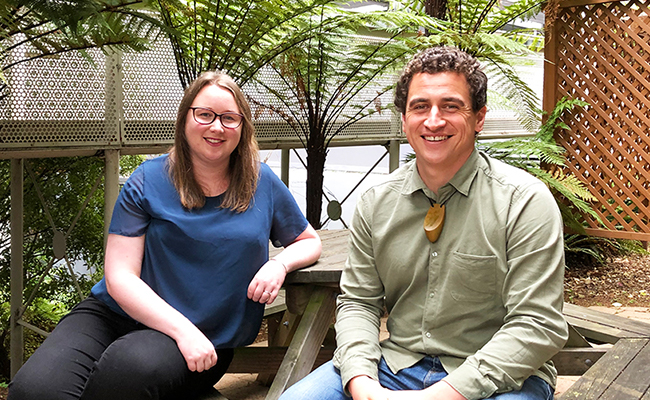Thursday 4 March 2021 7:25am

Amanda Clifford (Kāi Tahu, Kāti Māmoe, Waitaha) and Hitaua Arahanga-Doyle (Ngāi Tahu, Te Āti Haunui a Pāpārangi).
“This day has been a long time coming. In some ways, we’ve been looking for you for years. Why did it take us so long to find you?”
Those words were spoken by Professor Jamin Halberstadt at the mihi whakatau welcoming two new Māori academics to the Department of Psychology, Amanda Clifford (Kāi Tahu, Kāti Māmoe, Waitaha) and Hitaua Arahanga-Doyle (Ngāi Tahu, Te Āti Haunui a Pāpārangi).
Referencing his department’s reputation for excellence, Professor Halberstadt continued, “My point is that we don’t choose just anybody to be on this faculty, but we enthusiastically chose you.
“You are both among our very top students and both of you, we believe, have the potential to be world leaders in your fields, and role models for other students and your communities, who I know are already immensely proud of you.”
Both Miss Clifford and Mr Arahanga-Doyle have recently completed their Doctorates through the Department of Psychology and both say they are grateful for their new roles as kaiako.
Miss Clifford grew up in rural Southland and, along with her siblings, was the first generation to attend university.
Her study goal was to become a Clinical Psychologist, with her thesis research exploring how emotional reminiscing can promote children’s developing socio-emotional competencies.
“I believe that knowledge in this field is particularly effective in helping people recognise and understand the important components of the social world around us and how these components interact with one another, which are effective tools for any student.”
“It was during my postgraduate studies when I realised I love to teach, and becoming a kaiako not only allows me to teach, but also to continue to learn.
“I love the reciprocal relationship of ako and that tauira and kaiako can learn from each other, which I think will be very important in my mahi with clinical students as they go through their training.”
Mr Arahanga-Doyle’s research investigated the efficacy of combining social psychological interventions with Te Ao Māori cultural values, particularly whanaungatanga, with the aim of helping adolescents and young Māori students.
“Through my studies here, the Department has offered me many incredible opportunities to broaden my knowledge and expertise in psychology which has been foundational for both my professional and personal development,” Mr Arahanga-Doyle says.
“I believe that knowledge in this field is particularly effective in helping people recognise and understand the important components of the social world around us and how these components interact with one another, which are effective tools for any student.”
Both Miss Clifford and Mr Arahanga-Doyle say that mātauranga Māori will be the foundation of the mahi they continue to do as kaiako and kairakahau, including which research questions to ask, and how to ask them.
“I am really interested in how we can support tauira in learning about mātauranga Māori and how it can enrich the work they do wherever that may be,” Miss Clifford adds.
Professor Halberstadt says the process of recruiting Māori staff members was, for him, an enlightening experience. He added that, in retrospect, it felt like “we had been looking at the wrong things” when recruiting Māori staff.
“For example, I learned that bringing one’s mother to an interview is a sign of strength,” Professor Halberstadt says.
“We’ve been looking for people who could stand alone, but we should have been looking for people who could stand with others, who need their communities and whose communities need them.”
“It also helps ensure that our tauira Māori, who are often the first in their whānau to attend university and have travelled a long way from home, have a sense of belonging when they see that their kaiako is Māori.”
Professor Halberstadt says offering these academic roles speaks not only to their own individual excellence, but also to their whānau, teachers’ and elders’ success in nurturing it.
“It’s also a story of biculturalism, compromise, and respect,” he adds.
Sciences Associate Dean Māori Dr Tracy Perry says the mihi whakatau was a great occasion to celebrate the appointments of Miss Clifford and Mr Hitaua Arahanga-Doyle into academic positions.
“Their appointments acknowledge a focus on increasing Māori academic staff appointments in the Sciences in line with the Maori Strategic Framework,” Dr Perry says.
“These new staff are also seen as inspirational role models to those tauira Māori currently at University and for prospective Māori school leavers.”
“It also helps ensure that our tauira Māori, who are often the first in their whānau to attend university and have travelled a long way from home, have a sense of belonging when they see that their kaiako is Māori.”
Reflecting on his transition from tauira to kaiako in the Department of Psychology, Mr Arahanga-Doyle says that culturally, Otago is where he came to learn how to become an adult.
“The transition period from high school to university is massive, but the environment that is fostered and facilitated at Otago means that I didn’t go through that by myself.”
“I met lifelong friends that were, and still are, a huge part of any successes that I am fortunate enough to receive.”
Kōrero by Guy Frederick, Sciences Communications Adviser
